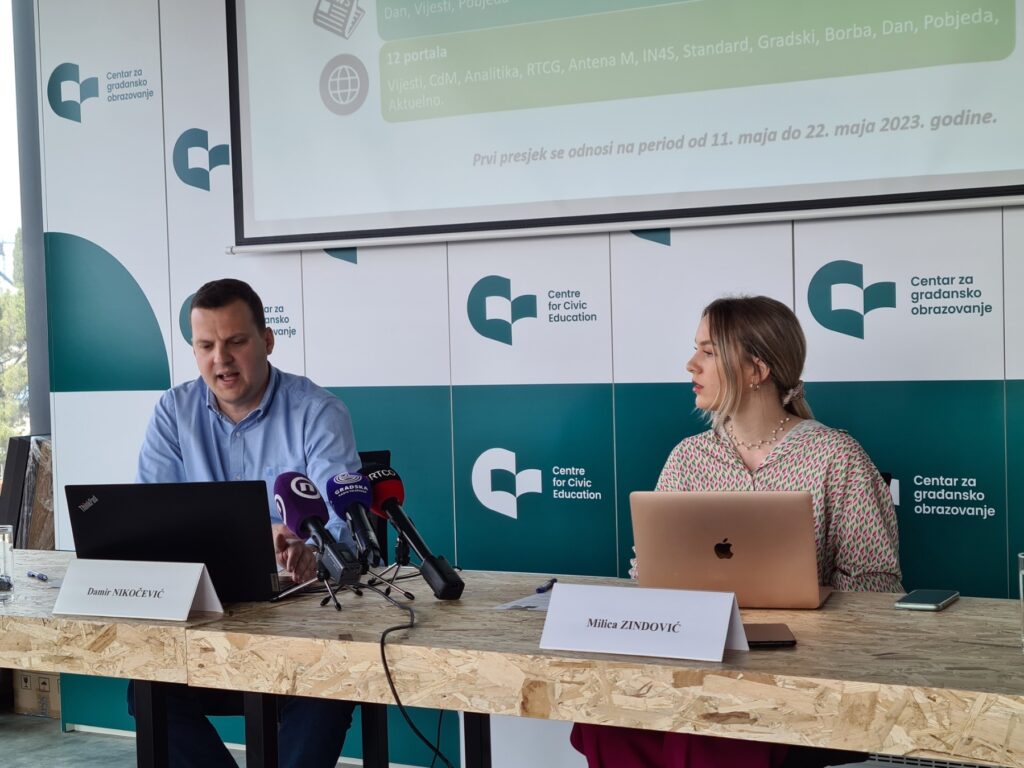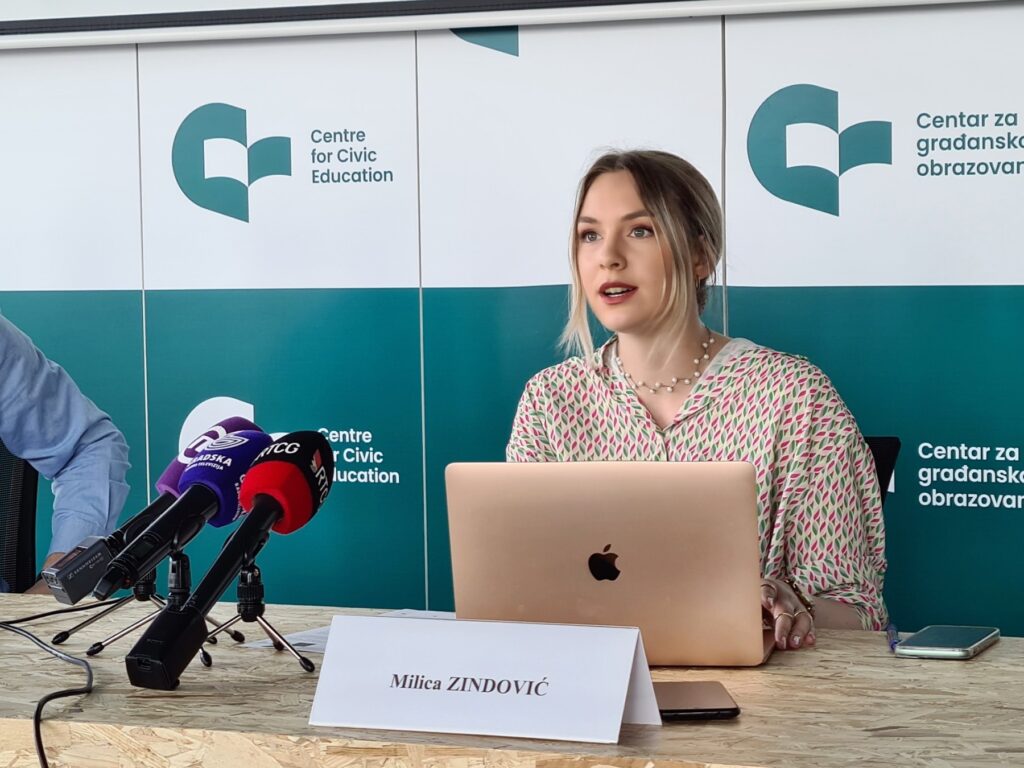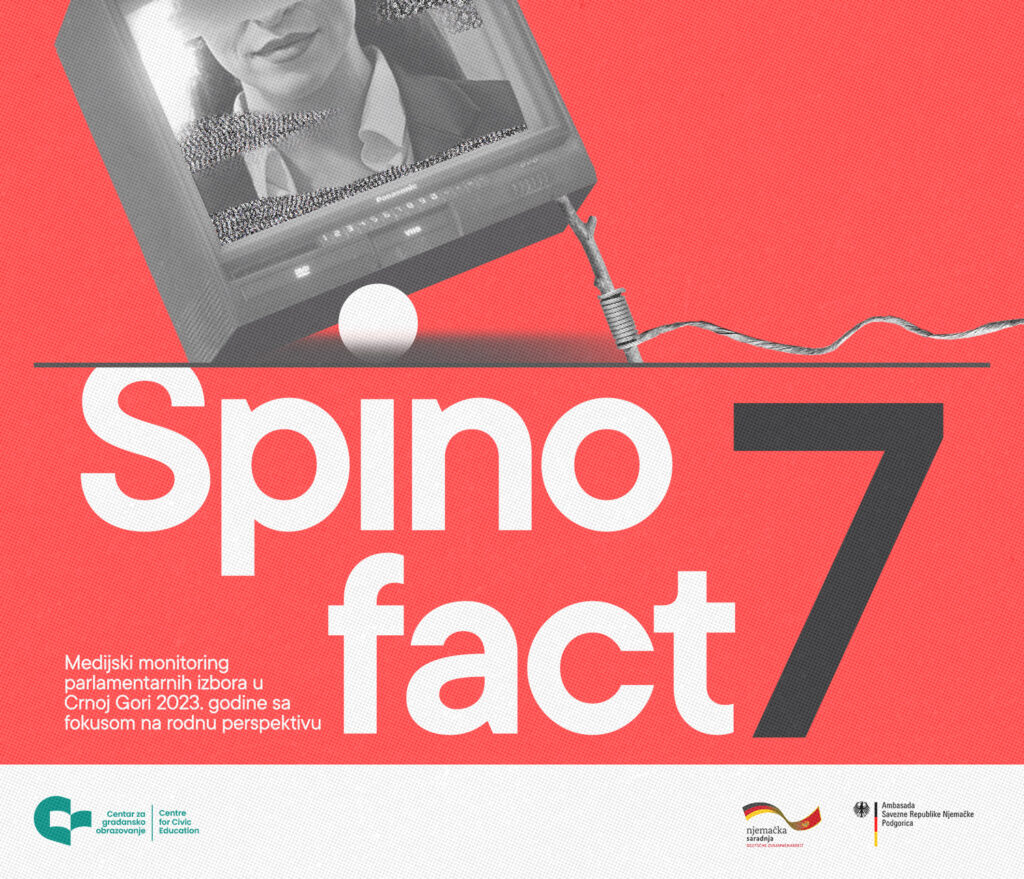Even though the campaign is not yet in full swing, a huge number of media posts related to the upcoming parliamentary elections are being recorded. The current course has been marked by topics related to the election model and result prediction, while the issue of gender equality remains on the margins. Reporting on the electoral lists is mainly neutral, and the highest number of positive and negative posts is recorded for the list led by DPS (Democratic Party of Socialists), with the largest political subjects receiving the most time and space. Gender equality topics are also underrepresented in political communication on social media, but it is encouraging to note the presence of less misogyny and hate speech. These are some of the key findings presented today at the press conference as part of the project “SPINoFACT 7 – Media Monitoring of the 2023 Parliamentary Elections in Montenegro with a focus on the gender perspective” conducted by the Centre for Civic Education (CCE) with the support of the Government of the Federal Republic of Germany.
The largest number of observed media so far
The first monitoring cross-section covered the period from 11 to 22 May 2023. CCE’s research includes 25 media, making it the largest number of analyzed media compared to all previous projects and similar initiatives implemented by the CCE. The monitoring includes 10 TV stations – TVCG, TV Vijesti, Nova M, Prva TV, Adria TV, Gradska TV, TV E, TV 7, TV A+, PINK M, as well as three newspapers – Dan, Vijesti, Pobjeda, and 12 portals – Vijesti, CdM, Analitika, RTCG, Antena M, IN4S, Standard, Gradski, Borba, Dan, Pobjeda, Aktuelno.
A huge number of media posts related to elections since the beginning of the campaign
During the observed period, a total of 2,594 media posts containing information related to the parliamentary elections in Montenegro were recorded. Due to differences in the functioning of the three types of media, as well as significant differences in terms of available media space for disseminating information and the number of observed media, online portals lead to the representation of information related to parliamentary elections, with 2,126 media posts. Unlike TV and print media, online portals publish significantly more party or political statements.
“The highest number of posts, in terms of portals, was recorded on the portal Gradski.me – 224, followed by the portals Analitika (208) and Borba (203). Regarding print media, we have the highest number of posts in the daily Pobjeda – 66, followed by Dan – 58, while Vijesti had 27 posts. When it comes to televisions, the topic of parliamentary elections was most represented on TV Adria – 51, followed by TV 7 with 47 posts and TV E with 36 posts,” specified Damir Nikočević, Development Coordinator at the CCE.
Ratings as the main topic and gender equality issues are on the margins
“Result prediction” emerges as the dominant topic in 1,112 media posts (43%). Gender equality-related topics had a relatively low representation at the primary level. Only 49 posts were recorded that primarily covered these topics (39 posts on “women’s political participation” and 10 on “violence against women – combating violence”). Taking into account the total number of posts generated by the parliamentary elections so far (2,594 posts), gender equality-related topics account for only about 2%,” emphasized Milica Zindović, Programme Associate at the CCE.
In the media posts related to the main observed topic (parliamentary elections), an attitude was determined also based on gender. In the overall narrative created during the pre-election campaign, the male voice dominates with 1,345 posts (52%). The female voice as dominant appears in 277 media posts (11%). “Sentiments were assigned to the posts about parliamentary elections about the image they create of women, and thus 111 positive sentiments, 2,475 neutral and 8 negative were identified, including 2 strongly negative ones,” Zindović stated.
“Candidates from the lists were present in 810 media posts, list leaders in 492, and other representatives of political parties who were not on the list were represented in the media 149 times. This indicates that leaders are no longer the ones who carry out political communication with voters. The diversity of subjects in addressing voters is a consequence of the ongoing generational shift in political life ahead of the upcoming parliamentary elections,” evaluated Nikočević.
Media coverage is mostly neutral, DPS generates the highest number of posts
“The largest number of posts in the media during the observed period was generated by the list led by the Democratic Party of Socialists (DPS) – 855. This does not mean that this list was well-represented, i.e., that it had the opportunity to address citizens in this number of posts. Namely, a significant number of mentions of this list were unplanned – mentioned by the media, analysts, addressed by the State Election Commission, and often by the competitors. Similar conclusions apply to the Movement Europe Now with 572 media posts, which ranks third. The coalition “For the Future of Montenegro” (NSD-DPP-LP) ranks second with 599 posts. The split within the former Democratic Front was largely covered by the media, which also led to an increased number of posts by its constituents. SDP and SNP generated a significant number of unplanned posts in which their success in the upcoming elections is assessed and predicted. The election list – Albanian Alliance recorded the fewest media posts,” said Damir Nikočević, presenting the representation of election lists in the media.
The monitoring team also assessed the tone of media posts about the election lists on a scale – positive, neutral, and negative. The media mostly reported neutrally on the election lists, with the highest number of neutral posts about pre-election activities across all lists. However, media polarization is most evident in the tone of media posts concerning the largest political subjects.
“The coalition „Together“ led by DPS has the highest number of negative posts – 176, followed by Movement Europe Now – 131, and the coalition ‘For the Future of Montenegro’ – 117. At the same time, the coalition „Together“ led by DPS has the highest number of positive posts in the media – 331, followed by the list ‘Democrats – URA „COURAGE counts“ – 199, Movement Europe Now – 152, and the coalition ‘For the Future of Montenegro’ – 150 positive posts. The only list that has more negative than positive posts is the coalition SNP – DEMOS „For you“ with 74 negatives and 49 positive posts. Media coverage of minority ethnic lists was predominantly neutral, with a smaller number of positive posts, and a very small number of negative posts being generated,” emphasized Nikočević.
“Although the reporting on all election lists was mostly neutral, it is interesting to note that the Movement for Change had the highest number of positive posts (13) on the portal Borba, and the highest number of negative posts on the portals CdM and Analitika – both with 8. SDP had the highest number of positive posts – 8 each – on the portals Antena M and CdM, and the highest number of negative posts on TV E (6) and the portal IN4S (5). The list led by DPS had by far the highest number of negative posts on the portal Borba (31), and the highest number of positive posts on the portals Antena M (34) and Gradski.me (33). Movement Europe Now had the highest number of negative posts on the portals Borba (23) and Gradski.me (15), and the highest number of positive posts again on the portal Borba (13), followed by portals Vijesti and Standard with 12 each,” added Nikočević.
“The coalition ‘For the Future of Montenegro’ had the highest number of negative posts on the portals Gradski.me – 21, Aktuelno – 14, and 13 each on the portals Analitika and Antena M. The highest number of positive posts for this coalition was on the portal Borba – 21. The Democrats – URA Alliance had the highest number of positive posts on the Public Broadcaster’s portal (rtcg.me) – 21, and 19 on Borba, while the highest number of negative posts was on the portal Gradski.me. The election list Albanian Alliance did not generate any negative media posts during the observed period,” said Nikočević.
The largest political subjects dominate media coverage
The expert team measured the time dedicated to election lists in prime-time television news and non-news programmes, as well as the cm2 coverage in print media. Specifically, it refers to planned media coverage that served election lists to present their political offers. The coalition DPS-SD-LPCG-DUA was by far the most represented on Grad TV, TV7, and TVE, as well as in the newspaper Pobjeda, it also ranks first in representation on RTCG, TV Vijesti, PRVA TV, and Nova M. The coalition “For the Future of Montenegro” had the most airtime on ADRIA TV, the Democrats – URA Alliance on A+ TV, and the Movement for Change on Pink M TV. Most space in the daily Vijesti was dedicated to the Movement Europe Now, and in the daily Dan to the Democrats- URA Alliance.
Gender equality issues are forgotten on social media
The CCE team analyzed the communication of election lists focusing on gender equality issues on three social media platforms – Facebook, Twitter, and Instagram. They monitored the official party pages run in the parliamentary elections, official coalition pages; official pages of major subjects, as well as all parties operating within them and supporting the election list; and official pages of party leaders and list leaders. The CCE team analyzed over 1100 posts generated on these pages, with the majority on Facebook (over 600), followed by Instagram (over 470) and Twitter (over 60).
“The general conclusion of the monitoring is that gender equality issues once again found themselves on the margins of the generated narrative on social media. Political communication only sporadically addressed these topics, mostly focusing on the political participation of women and the fight against violence against women, while topics such as the political and economic empowerment of women, and the social, economic, cultural, sexual, and reproductive rights of women did not receive attention from any observed subject. Moreover, even the small number of posts targeting this theme were predominantly generated by women, and there was a certain lack of understanding or immaturity of political subjects when it comes to these topics, considering the way they talk about women. These elections indicate that parties and candidates do not perceive this issue as significant and instead prioritize other issues that they believe bring more political points,” emphasized Milica Zindović.
Regarding Facebook, the subjects that most communicated about these issues were the Bosniak Party, Movemebr for Changes, SNP, URA, Boris Mugoša, and Alternative Montenegro, while the SD, DPS, and We Can – for Civic Montenegro had one post each dedicated to these issues. Similarly, on Instagram, the most active subjects were DPS, We Can, Bosniak Party, SNP, and URA, with almost no posts specifically addressing gender equality issues. Parties were least active on Twitter, which can be partly explained by the fact that many do not have open accounts on this platform. The only parties that communicated about gender equality issues on Twitter were DPS, SD, and the Bosniak Party.
Fewer misogynistic comments and hate speech
“It is interesting that, unlike the presidential and especially the local elections in 2022, in the first part of the campaign, social media were not strongly marked by outbursts of hate speech, misogynistic, offensive, and negative comments directed at women, although they exist to some extent. The subject of such comments was predominantly Božena Jelušić, Jelena Božović, Aleksandra Vuković Kuč, Milena Vuković Sekulić, Simonida Kordić, Jelena Nedović, and Olivera Injac,” stressed Zindović.
The media monitoring is conducted within the project “SPINoFACT 7 – Media Monitoring of the 2023 Parliamentary Elections in Montenegro with a focus on the gender perspective,” implemented by the CCE with the support of the Government of the FR of Germany. The agency Arhimed provided professional support for monitoring television, print media, and portals, while monitors were engaged to track social media content daily. After the parliamentary elections are concluded, CCE will present the final findings, which will be included in a broader study addressing these issues.
Maja Marinović, Programme associate



